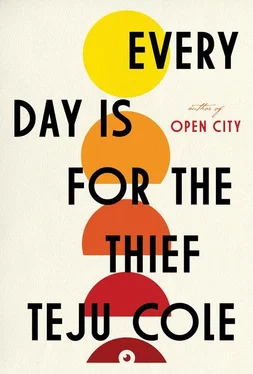— Actually I should be getting back.
He hasn’t finished his drink. I put Mrs. Aboaba’s books in a plastic bag and hand them to him. We walk outside. It is a cloudless day, and the concrete finish of the compound is white in the sunlight. Our shadows bob in front of us. Chinedu begins to sweat right away. I do not perspire as easily, but the cool sensation I had got from my shower is gone. We walk slowly toward the gate, past the open, empty kennels, and as we walk, I thank him. He smiles broadly and says “actually” again, but then he stops and thinks about how to phrase what is on his mind. His eyes are bright. He says:
— I don’t want to cause any, I don’t know, any trouble.
— No trouble at all.
— What I mean is, I don’t want my boss to be displeased with me. So, if possible, you don’t have to tell her—
I nod and assure him that I don’t intend on sending any reports to his boss. I tell him to feel free to say whatever he wants.
— Well, the thing, sir, is that I am so happy to meet you. I have always heard about people who went over there, you know, to America. But I have never been chanced to meet one. So this is a good day for me.
He pauses and searches my face, still smiling. Then he goes on:
— Actually I want to know you. I mean, actually, to have us know each other, you know. Maybe one day, by knowing you, I can have a chance to go to America. To know each other, actually, just as friends.
He reminds me of Leonard Bast in Howards End . The acute awareness of a social gap and the hope, yet, that the gap can be bridged by enthusiasm and application. He reminds me, painfully, of myself, of times when I was the one in socially asymmetrical situations, in my early years in the United States, the times when I had been someone else’s Leonard Bast. There had been that vague humiliation of knowing one deserved better. And here are millions who, justly or otherwise, feel they deserve better. We reach the gate. I unlatch it.
— I understand that. I hear what you’re saying.
— Oh, sir, I am so glad you understand, actually. As I said, I am happy to know you. If we could exchange telephone numbers, you know, just to stay in touch. Or your email contact. If you are okay with that.
— Yes, I’m all right. The thing is, Chinedu, I still have to come to Mrs. Aboaba’s office before I leave Nigeria. So no rush. I’ll see you then, you know, we can exchange information then. Because this phone in my hand now belongs to my aunt. So later will be better.
— Okay, okay. Actually that’s good. I hope to see you there. I’m there every day.
— And don’t worry. I won’t tell your boss. Thanks again for coming to pick up these books. See you soon?
— Yes, oh yes. Thank you.
I shake his hand, knowing full well I will never see him again. He is still grinning, the pearly rows interrupted by that single derelict incisor. He makes as if to say something else, but he changes his mind. Nodding, smiling, without further words, we wave each other goodbye. He begins to walk down the long, quiet stretch of unpaved road that leads to the gate of the estate. In a few minutes he will be at the bus terminal and once again join that great mass of the deserving, those countless others awaiting miracles. He keeps to the center of the road, walking at an even clip. I watch him for a long time, and his figure gradually becomes insubstantial as the little clouds of dust take over. After a while, there is only the road.
I spend three days in a feverish haze, and by the time the twenty-seventh of December arrives, a Tuesday, the date printed on my return ticket, I am in bed in agony. I am hot, cold, hot, huddling in near nakedness under a heavy swathe of blankets, sweating and shivering, my joints hurting. The large dose of Coartem I take seems to temper these symptoms, but it has terrible side effects. I vomit a great volume of liquids, mostly the oatmeal I had for breakfast. And I have to run repeatedly to the toilet to void liquid shit, the body frantic in its attempt to clear itself of the pathogen. I take thalazole to control the stools, mefloquine for the malaria. I hear footsteps, heavy breathing, the sound of a blade edge being worked on stone, the dull flapping of a great-coat. At the most delirious moment, I think: He’s come for me. But the thought flits past, and so do the hallucinations.
A guest comes to the bedroom in the late morning. Oluwafemi is a friend from my days in Zaria. He was a junior student to me. Like almost all the other young people I haven’t seen in well over a decade, he has grown to imposing size. He is a lawyer in training and is ambitious to someday open a corporate law firm in Lagos.
— I have malaria.
— Oh, I don’t say that.
I am puzzled.
— But what do you mean? I have malaria.
— I mean I don’t say things like “I have malaria.” The tongue is very powerful, you know.
— Oh. Well, that’s fine and dandy. But the thing, old man, is that I actually do have malaria. So I do say that. I’ve been sick as a dog for the past twenty-four hours.
— It’s saying it that makes it so. You’re not sick.
I don’t really want to argue with him. At that point, I hurry to the water closet to relieve a sudden urge. When I come back, crawling back into bed, I say:
— The female Anopheles mosquito has caught up with me. That’s the reality. It’s the plasmodium parasite denaturing my red blood cells that makes it so, and the sooner I admit that to myself, the sooner I can start treating the disease, Oluwafemi. There’s no point in being counterfactual.
I search his face, in vain, for signs of comprehension. He only shakes his head, as if he feels sorry for me, stuck as I am in a scientific view of the world. “Relax! God is in control.” And in his attitude, I find a key to much of what I have observed in the preceding weeks. The idea that saying makes it so, that the laws of the imagination matter more than all others. But of course, Oluwafemi is vindicated: he is in the pink of health, and it is I, careless of tongue and lacking in faith, who lie under the clammy sheets.
The illness is still in my body when I arrive at the airport for departure. I am feverish, not at all eager to travel. I consider canceling my flight. The officer checking me in asks, rather morosely, if I have anything for him. Dollars perhaps, or naira. No, I say, showing him my palms, I am empty. My bags are searched and, found free of contraband, tagged. They are picked up by a cheerful baggage handler. Anything for him, he wants to know, anything at all? No — nothing tonight, nothing. I go through security and head to the gate. From the plate glass of the terminal, a line of great phosphorescent lamps shines through the dusk, all along the wider tunnel in the main building, until we come to the gate and enter the narrower, enclosed tunnel, and board the aircraft. I buckle myself into the seat. Droplets rapidly form and evaporate on my forehead. All around me, the bustle of departure, people with too much carry-on luggage, disputations over seating assignments. Jets of dry air hiss out of the overhead nozzles and there is a feeling of compression in the cabin. The word “home” sits in my mouth like foreign food. So simple a word, and so hard to pin to its meaning. We have not left yet, and already there is something drawing me back to this city, this country. After the plane is filled, and everyone is sitting and buckled in, and all the overhead compartments are closed, we are stalled on the tarmac for half an hour. And then, at last, and with no explanation from the flight staff, we begin to move. I place my head against the small window.
The plane sheds ballast and rises above the city, rises above the countless small dots of light that are scattered like stars across the landscape, rises slowly into the cloudless harmattan night, easing the compression, rises deep into the ether, until there is nothing visible in the darkness below except for the earth’s dark curve.
Читать дальше












